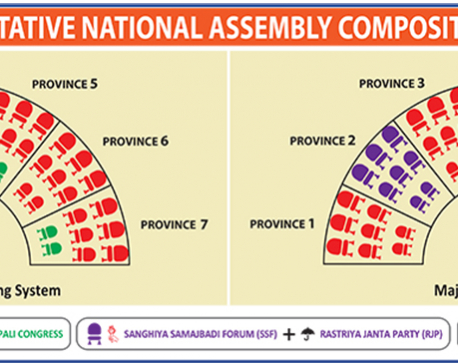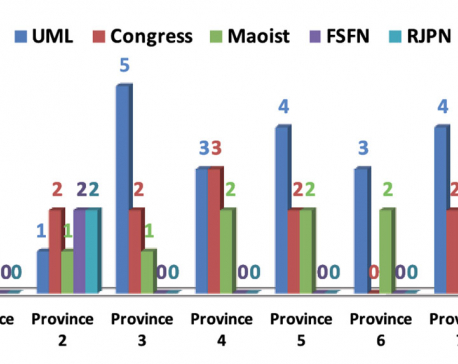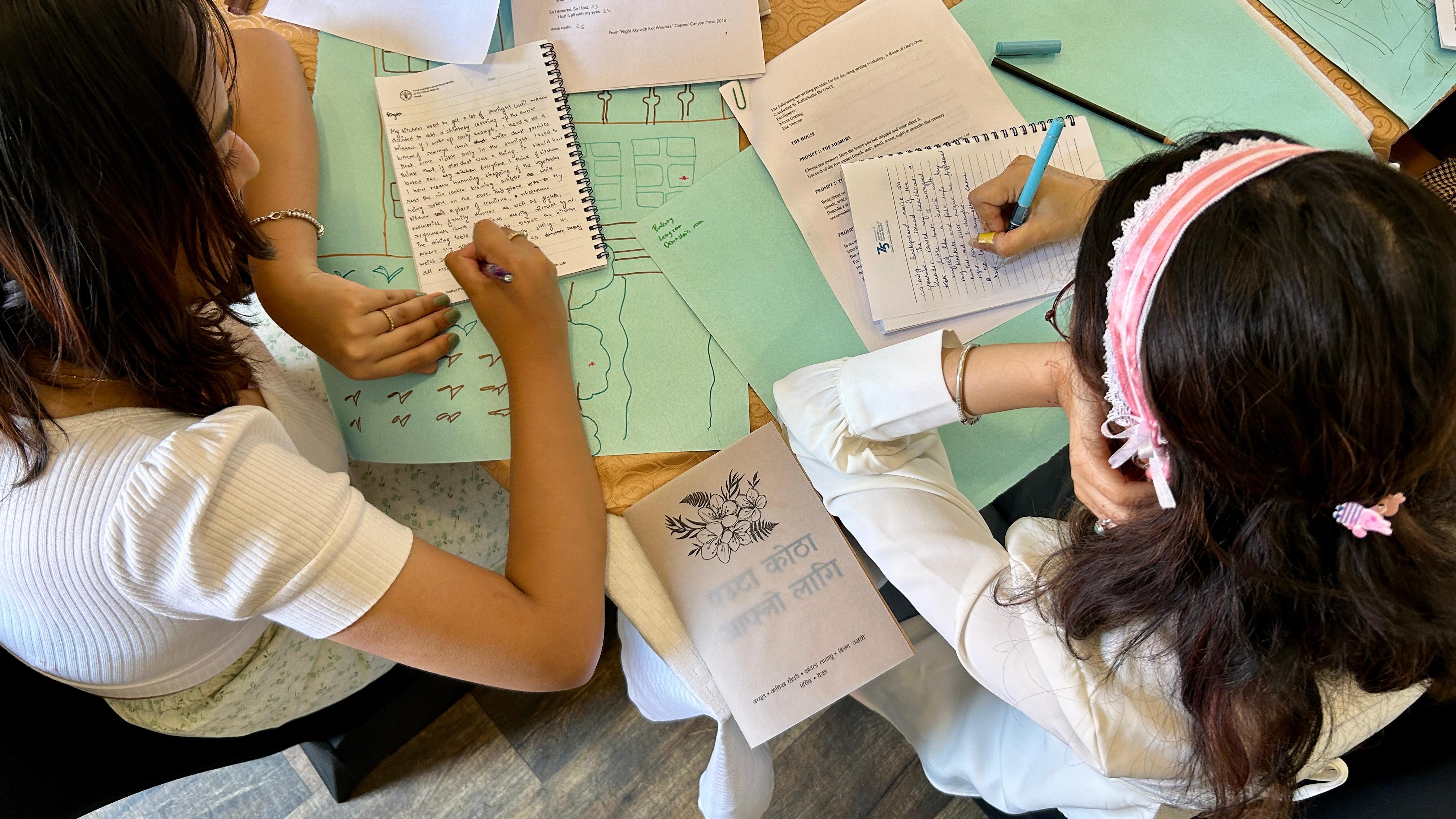
OR
Left sweeps upper house with 37 seats
Published On: February 8, 2018 01:21 AM NPT By: Republica | @RepublicaNepal
Way cleared for new government formation
KATHMANDU, Feb 7: Election to the National Assembly was held on Wednesday in six provinces of the total seven, paving way for the long-delayed power transfer to the poll-winning parties.
An electoral college comprising of chiefs and deputy chiefs of 753 local units and members of the provincial assemblies voted to elect 32 out of 56 members of the upper house after parties failed to produce consensus candidates under various quotas as stated in the constitution. In Province 2, all eight upper house members were elected unopposed well ahead of the poll day. Other 16 members from the remaining six provinces were also elected unopposed.
Fifty-two members from 13 parties were in the fray for the remaining upper house seats.
The 32 candidates were elected under the single transferable voting system. The upper house election was held two months after the elections of the federal parliament and provincial assemblies.
Out of the 2,056 members of the electoral college, 1,677 were eligible to vote for the remaining 32 upper house members after 24 members were already elected unopposed.
"Preliminary reports suggested 99.52 percent voter turnout. Only eight members remained absent in the voting," said Chief Election Commissioner Ayodhee Prasad Yadav.
Election officers have announced poll results of 53 seats while vote counting for three members is under open category was underway in Province 6 as of Wednesday evening. Among the total seats, the left alliance has won 37 seats whereas the Nepali Congress (NC) has bagged 13 seats. UML, which leads the alliance, bagged 26 seats and the Maoist leaders secured 13 in upper house. FSFN won 2 seats and RJPN was limited to a single seat.
In Province 4, provincial assembly member Deepak Manage, who was convicted of murder after being elected to the post, remained absent in the election. Some other members of smaller parties did not participate in the election after seeing no possibility of electing their representatives.
The constitution has a provision to elect 59-member upper house. Of the total seats, the government appoints three members whereas the electoral college elects 56 members.
The election officers started vote counting in respective election offices soon after the voting was over.
Earlier, the parties were divided over announcing the results of the central parliament prior to the National Assembly election. The ruling coalition led by Nepali Congress was for announcing results of the proportional representation (PR) seats of central parliament only after the upper house poll whereas the left alliance had demanded immediate announcement of poll results.
The EC took side of the ruling parties and delayed announcing the PR results.
Even as the parliamentary and provincial assemblies concluded some two months ago, the Election Commission was reluctant to announce the poll results citing unclear constitutional provisions. This had barred the poll winning left alliance from forming the new government. Instead, Nepali Congress-led coalition, which faced a resounding defeat in the election, held on to power and made numerous controversial decisions.
The election body plans to handover the overall poll results to the president after the vote counting of the upper house is over and clear the way for formation of new government. It is expected that the poll results could be handed over to the president within February 19. After the submission of the poll results, the party commanding majority will urge the president to let them form the new government. Despite announcing the poll results under the first-past-the-post electoral system, the EC has not allocated parliamentary PR seats so far.
Province 1
Parshu Meghi Gurung CPN-UML
Harisharan Shiwakoti CPN-UML
Nainkala Ojha (woman) CPN-UML
Bina Pokharel (woman) CPN (Maoist Center)
Sarita Prasai (woman) Nepali Congress
Ramesh Jung Rayamajhi Nepali Congress
Kem Nepali (Dalit) CPN-UML
Agam Prasad Bantawa (disabled) CPN-UML
Province 2
Shashikala Dahal (woman) CPN (Maoist Center)
Mokta Kumari Yadav (woman) Nepali Congress
Urmila Devi Yadav (woman) FSFN
Ramprit Paswan (Dalit) FSFN
Brikesh Chandara Lal (minority) RJPN
Ramesh Yadav (open) Nepali Congress
Jitendra Dev (open) Nepali Congress
Suman Pyakurel (open) CPN-UML
Province 3
Balram Banskota (open) CPN-UML
Ram Bahadur Thapa CPN (Maoist Center)
Radheshyam Adhikari Nepali Congress
Singha Bahadur BK CPN-UML
Parwati Rawal (woman) CPN-UML
Udaya Sharma Poudel (woman) CPN-UML
Dhankumari Khatiwada (woman) CPN-UML
Ram Chandra Rai CPN-UML
Singha Bahadur BK (Dalit) CPN-UML
Province 4
Khim Bahadur BK (Dalit) CPN (Maoist Center)
Prakash Pantha (disabled) Nepali Congress
Brinda Ale Magar (woman) Nepali Congress
Shati Adhikari (woman) CPN-UML
Dipa Gurung (woman) CPN-UML
Surendra Raj Pandey (open) Nepali Congress
Ganesh Timalsina (open) CPN-UML
Dinanath Sharma (open) CPN (Maoist Center)
Province 5
Khim Lal Bhattarai (open) CPN-UML
Ram Lakhan Chamar (Dalit) CPN-UML
Komal Oli (woman) CPN-UML
Mina Budha (woman) CPN-UML
Durga P Upadhyay (open) Nepali Congress
Anita Devkota (woman) Nepali Congress
Chandra B Khadka (open) CPN (Maoist Center)
Raj Kumar Kunwar (disabled) CPN (Moaist Center)
Province 6
Narpati Lohar (Dalit) CPN-UML
Jiban Budha CPN (Maoist Center)
Kabita Bogati (woman) CPN (Maoist Center)
Utul Tamang (woman) CPN-UML
Nanda Chapai (woman) CPN-UML
Vote counting underway under open quota
Province 7
Mahesh K. Mahara (minorities/disabled) CPN (Maoist Center)
Chakra Prasad Shahi (Dalit) CPN-UML
Badri Prasad Pandey Nepali Congress
Sher Bahadur Kunwar CPN-UML
Hareram Chaudhary CPN (Maoist Center)
Kamala Oli (woman) CPN-UML
Indu Kadariya (woman) CPN-UML
Tara Devi Bhatta (woman) Nepali Congress
You May Like This

Left to sweep upper house under majority system, a few seats for NC under STV
KATHMANDU, Dec 20: The dispute between Nepali Congress (NC) and the CPN-UML over the system for constituting the National Assembly (NA)... Read More...

UML wins 27 upper house seats
KATHMANDU, Feb 9: The CPN-UML has won nearly half the seats of the upper house in the elections held on... Read More...

Sky-blue is the colour of House of Representatives and red that of Upper House
KATHMANDU, Jan 3: The Legislature-Parliament Secretariat is using different colours of upholstery and carpet to refurbish the House of Representatives... Read More...





Just In
- 104 houses gutted in fire in Matihani (With Photos)
- By-elections: Silence period starts from today, campaigning prohibited
- A Room of One's Own- Creative Writing Workshop for Queer Youth
- Tattva Farms rejuvenates Nepali kitchens with flavored jaggery
- Evidence-Based Policy Making in Nepal: Challenges and the Way Forward
- Insurers stop settling insurance claims after they fail to get subsidies from government
- Nepal-Qatar Relations: Prioritize promoting interests of Nepali migrant workers
- Health ministry to conduct ‘search and vaccinate’ campaign on May 13













Leave A Comment